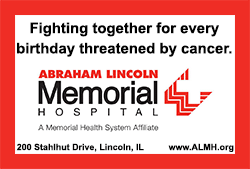|
Prairie Center Against Sexual
Assault providing services to Logan County adults, children and
parents
 Send a link to a friend
Send a link to a friend
 [June 23, 2018] [June 23, 2018]
LINCOLN
On Thursday, June 14th, the Abraham Lincoln Memorial Hospital
Community Health Collaborative (CHC) hosted a meeting at the
hospital. The purpose of the one hour event was to review the work
that is currently underway with the different committees within the
collaborative.
The day began with a guest speaker, Jody Clark from the Prairie
Center Against Sexual Assault. Clark is an adult/child therapist who
works exclusively with victims of sexual assault including rape,
incest, sodomy, attempted rape and sexual touches.
Clark was introduced by Community Health Collaborative Director
Angela Stoltzenburg, who said that the information about the center
was new to her, though Clark said that the center is not a new
organization and it has been providing services in Logan County for
a while.
Clark explained that the center serves eleven counties with three
regional offices in central Illinois. Logan County is coupled with
Christian County and clientele are served by her office in
Taylorville.
Clark said that the center works with adult survivors, and has
recently returned to providing services for children ages three and
up. She explained that initially state budget cuts impacted their
ability to serve younger clients. There are also more organizations
working with child victims than with adults. The center felt that
maintaining the adult services was the best way that they could have
a positive impact.
Clark said now state funding has changed again, and the center is
able to offer services to children on a case-by-case basis.
Clark defined the center as a “healing agency” saying that they are
not investigative. No one from the center will interrogate victims,
nor will they offer investigation into alleged cases of sexual
assault. The goal of the agency is to assist the victim in
recovering from the trauma of the assault and also to offer medical
and legal advocacy.
She said that all the services provided are free of charge. They
work only with victims, not with perpetrators.
Clark summarized some of the programs offered through Prairie
Center:

Medical advocacy
When a victim arrives at the hospital, they may request that the
center be called. Once that call comes to the center, advocates have
one hour to respond. They go to the hospital to be with the victim
and to guide them through the process. She said that victims need to
be assured that all their rights are being met, that they are
receiving the treatment and services they need.
Legal Advocacy
The legal advocate is a professional advocate who will go to court
with the victim to assure that they are not going through the
process alone. The legal advocates work with the states attorneys’
and the city and/or county police departments. The advocates will be
the ones who call the local officials to receive updates on the
case, and then will share that information with the victim. She said
this is a better way to go about getting updates, because when
victims call, they don’t know what to ask or how to get the
information they need. They are often given vague answers such as
“there is a continuance.” That doesn’t really tell the victim what
is going on. The legal advocates are trained to pull more
information out of the attorney so that the victim can then
understand why there was a continuance and what impact that will
have on them personally.
In addition, the legal advocates can assist the victims in getting
orders of protection. She went on to explain that there are two
types of protection orders and victims don’t always know this. The
Order of Protection is specifically for victims who are in a
relationship with their assailant. For this situation “relationship”
can mean a relative, a date or a companion.

[to top of second column] |

While there are cases that do involve family members or partners, often there
are cases where the assailant is not known to the victim on a personal level,
there is no past relationship or familial connection. In those cases a Civil No
Contact Order should be requested. The advocates will assist the victims in
determining what type of order is needed and will assist in getting that order.
Hot Line
The center has a 24/7 hotline number 217-753-8081. This is a great resource for
victims as they work through the emotional trauma of what has happened to them.
Clark offered for example that victims often have flashbacks or nightmares about
what they went through.
She went on to say that the hotline is manned by trained individuals, either
staff or volunteers, but all are well trained in how to offer assistance and
comfort.
She said the hotline is available to everyone, and anyone can call in
anonymously if they wish. They can talk about what has happened to them and can
get recommendations on how to move forward.

Wellness program
Clark said this is a new program that she feels will be very beneficial to
victims. The program utilizes a massage therapist who offers comfort and helps
the victim work through issues of touch. She explained that after an assault
many victims have issues with being touched in any way. It is an internal fear
or a memory trigger. The therapy sessions help the victim to associate touch
with comfort over fear and gets them back to a point where they can tolerate and
even appreciate human touch.
The therapist will also use music and aroma therapy to help the victim though
the process.
Community education
One in three girls are sexually abused before they turn 18 and one in five boys.
Clark said the center is pushing on working with the community to educate and
promote awareness and assault prevention. The program teaches in classrooms
starting with young children on ‘good touch – bad touch” and moves on to
internet safety, bullying, dating safety, relationships and consent.
There is also a push to educate parents on how to respond when a child discloses
an assault. She said that often times, what parents believe to be the right
thing to say and do is just the opposite, causing the child to shut down or stop
talking about what has happened to them.
Additionally, mom sobbing and dad losing his temper and lashing out are
unpleasant experiences for a child who has already gone through something bad.
When parents respond in this manner, the child may shut down because they don’t
want to hurt mom and dad.
Clark said that the center provides education on how to respond to a disclosure
and how to help a child or teen feel safe and reassured as they talk about what
happened to him or her.

Clark was limited on time, so she stopped her presentation there saying that
this was a topic that she could talk about all day because it is so important
that we become educated about the stigma’s of rape and sexual assault, and it is
so important that victims know they have resources and people who will advocate
for them and help them deal with the trauma and the post-traumatic impacts of
their assault.
She handed out a pamphlet about the Prairie Center Against Sexual Assault and
encouraged everyone to take note of the 24-hour hotline number.
If you have experienced unwanted sexual advances, have been raped or assaulted,
the primary message is that you are not alone in what you are going through,
there are people who will help you and lead you through the healing process.
To get help contact the Prairie Center Against Sexual Assault in Taylorville by
calling 217-824-9895, or call their hotline at 217-753-8081.
[Nila Smith] |